Related Research Articles

The Clash were an English rock band that formed in London in 1976 and were key players in the original wave of British punk rock. Billed as "The Only Band That Matters", they used elements of reggae, dub, funk, ska, and rockabilly, and they contributed to the post-punk and new wave movements that followed punk. For most of their recording career, the Clash consisted of lead vocalist and rhythm guitarist Joe Strummer, lead guitarist and vocalist Mick Jones, bassist Paul Simonon, and drummer Nicky "Topper" Headon.

John Graham Mellor, known professionally as Joe Strummer, was a British musician. He was the co-founder, lyricist, rhythm guitarist, and lead vocalist of punk rock band the Clash, formed in 1976. The Clash's second studio album, Give 'Em Enough Rope (1978), reached No. 2 on the UK charts. Soon after, they achieved success in the US, starting with London Calling (1979) and peaking with Combat Rock (1982), which reached No. 7 on the US charts and was certified 2× platinum there. The Clash's explosive political lyrics, musical experimentation, and rebellious attitude greatly influenced rock music in general, especially alternative rock. Their music incorporated punk with reggae, ska, dub, funk, rap, and rockabilly.
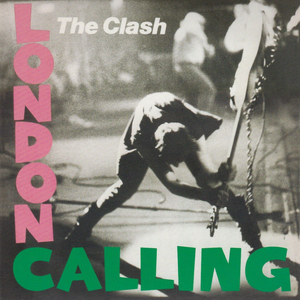
London Calling is the third studio album by the English rock band the Clash. It was originally released as a double album in the United Kingdom on 14 December 1979 by CBS Records, and in the United States in January 1980 by Epic Records.
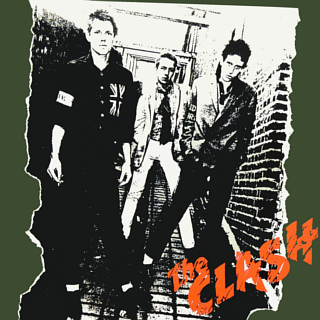
The Clash is the debut studio album by the English punk rock band the Clash, released on 8 April 1977 through CBS Records. Recorded and mixed over three weeks in February 1977 for £4,000, it would go on to reach No. 12 on the UK charts, and has been included on many retrospective rankings as one of the greatest punk albums of all time.

Sandinista! is the fourth studio album by the English punk rock band the Clash. It was released on 12 December 1980 as a triple album containing 36 tracks, with 6 songs on each side. It crosses various genres including funk, reggae, jazz, gospel, rockabilly, folk, dub, rhythm and blues, calypso, disco, and rap. For the first time, the band's songs were credited to the Clash as a group, rather than to Joe Strummer and Mick Jones. The band agreed to a decrease in album royalties in order to release the 3-LP at a low price.

The Mescaleros were the British backing band for British singer, musician and songwriter Joe Strummer, formed in 1999, which issued three albums prior to Strummer's death in 2002.
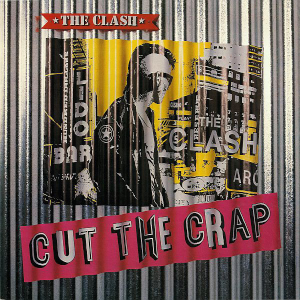
Cut the Crap is the sixth and final studio album by the English punk band the Clash, released on 4 November 1985 by CBS Records. It was recorded in early 1985 at Weryton Studios, Munich, following a turbulent period: co-founder, lead guitarist and co-principal songwriter Mick Jones and drummer Topper Headon had been dismissed by lead vocalist Joe Strummer and bassist Paul Simonon. Jones and Headon were replaced by three unknowns: guitarists Vince White and Nick Sheppard and drummer Pete Howard. During the tense recording sessions, Clash manager Bernie Rhodes and Strummer fought each other for control over the band's songwriting and musical direction.

"London Calling" is a song by the British punk rock band the Clash. It was released as a single from the band's 1979 double album of the same name. This apocalyptic, politically charged rant features the band's post-punk sound, electric guitar and vocals.
"Spanish Bombs" is a song by English punk rock band The Clash, with principal vocals by Joe Strummer and additional vocals by Mick Jones. It was written by Strummer and recorded for the band's 1979 album London Calling.

"(White Man) In Hammersmith Palais" is a song by the English punk rock band the Clash. It was originally released as a 7-inch single, with the b-side "The Prisoner", on 16 June 1978 through CBS Records.
"Police and Thieves" is a reggae song first recorded by the falsetto singer Junior Murvin in 1976. It was covered by the punk band The Clash and included on their self-titled debut album released in 1977.

"Train in Vain" is a song by the English punk rock band the Clash. It was released as the third and final single from their third studio album, London Calling (1979). The song was not originally listed on the album's track listing, appearing as a hidden track at the end of the album. This was because the track was added to the record at the last minute, when the sleeve was already in production. Some editions include the song in the track listing. It was the first Clash song to reach the United States Top 30 charts and in 2010, the song was ranked number 298 on Rolling Stone magazine's list of The 500 Greatest Songs of All Time.
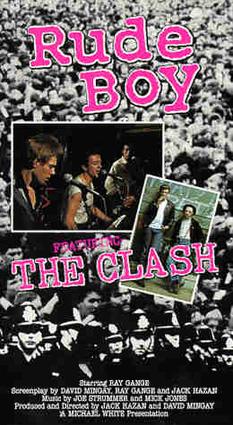
Rude Boy is a 1980 British film directed by Jack Hazan and David Mingay and filmed in 1978 and early 1979.
"The Guns of Brixton" is a song by the English punk rock band the Clash, originally released on their 1979 album London Calling. It was written and sung by bassist Paul Simonon, who grew up in Brixton, South London. The song has a strong reggae influence, reflecting the culture of the area and the reggae gangster film The Harder They Come.
"Lost in the Supermarket" is a 1979 song by the Clash. Written by Joe Strummer and Mick Jones and produced by Guy Stevens, it is credited to the Strummer/Jones songwriting partnership. It was released on their third studio album London Calling. It is the eighth song on the track listing. Although it features Jones on lead vocals, the song was written by Strummer. The supermarket in question was the International, located at 471–473 Kings Road, beneath the World's End Estate. Strummer lived at 31 Whistler Walk at the time with his girlfriend Gaby Salter, her two younger brothers and her mother. The song appears in the Apple TV+ show Loot.
"I'm So Bored with the U.S.A." is a song by British punk rock band the Clash, featured on their critically acclaimed 1977 debut album, which was released in the United States in July 1979 as their second album after Give 'Em Enough Rope. It was the album's third track in the original version and second in the US version.

"Clash City Rockers" is a song by English rock band the Clash. It was first released in February 1978 as a single with the B-side "Jail Guitar Doors", the latter a re-worked version of a song from Joe Strummer's pub rock days. "Clash City Rockers" was the second of three non-album singles released between the group's eponymous first album in 1977 and their second album, Give 'Em Enough Rope (1978). It was later included as the opening track of the belated US version of the band's debut album.
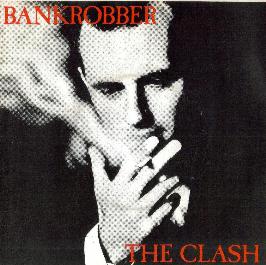
"Bankrobber" is a song by English punk rock band the Clash. The song was not released on any of their studio albums, instead appearing on their compilation Black Market Clash. Upon its 1980 release as a single it peaked at number 12 on the UK Singles Chart, and at number 14 on both the Irish Singles Chart and the New Zealand Singles Chart.
"Garageland" is a song by English punk rock band The Clash featured as the final track for their 1977 debut album The Clash.
Danny Ray is a Jamaican-born reggae singer and record producer who has been based in the United Kingdom since the late 1960s. He recorded for MCA Records and Trojan Records in the early 1970s and later set up his own Black Jack label.
References
- ↑ Segretto, Mike (2022). "1979". 33 1/3 Revolutions Per Minute - A Critical Trip Through the Rock LP Era, 1955–1999. Backbeat. pp. 362–364. ISBN 9781493064601.
- 1 2 Salewicz 2008, p. 251
- 1 2 "Revolution Rock by the Clash". Songfacts. Retrieved June 24, 2018.
- ↑ Gray 2010, p. 310
- ↑ Egan 2014, p. 132
- ↑ Partridge, Kenneth (December 13, 2014). "The Clash's 'London Calling' at 35: Classic Track-by-Track Album Review". Billboard . Retrieved June 24, 2018.